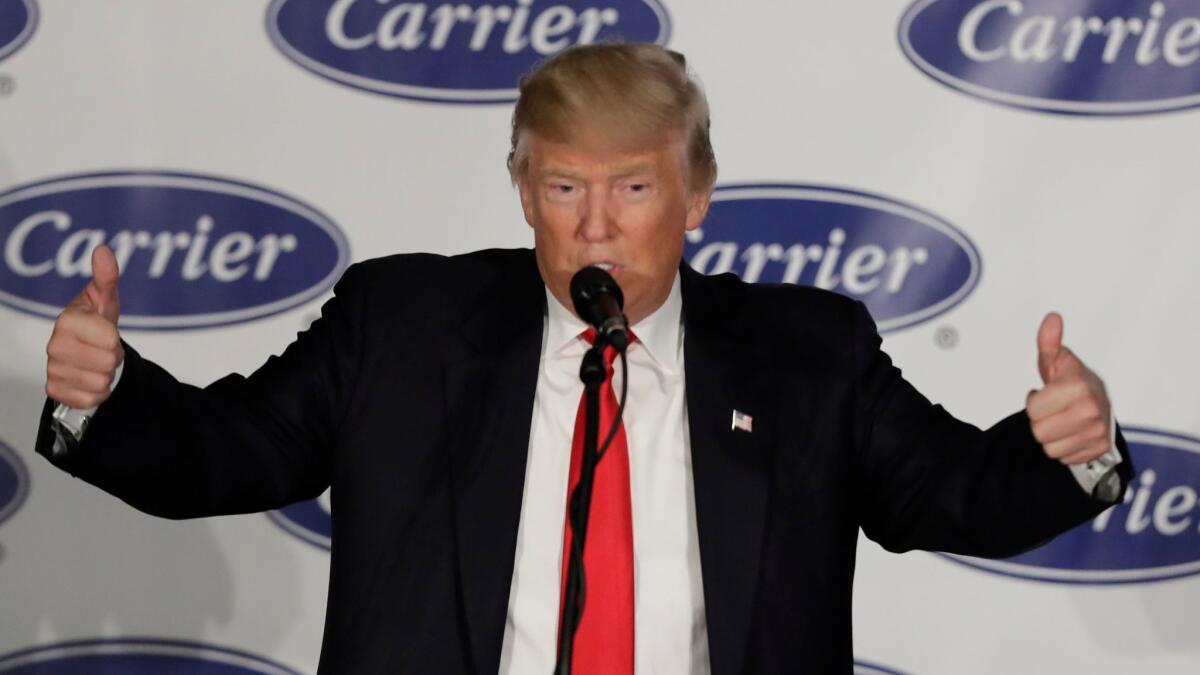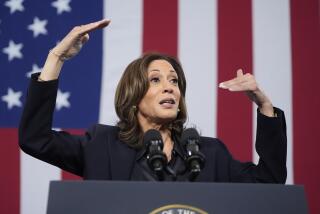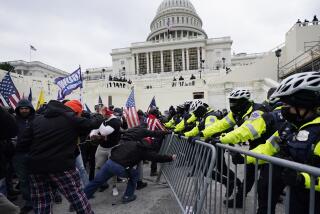Trump struck the Carrier deal in the dark. An Indiana group is suing to learn details

Maybe it happened in person. Or by phone. Or through email.
Kerwin Olson wanted to know how the incoming president of the United States struck a deal to save the jobs of hundreds of workers in his city — seemingly in the span of a week.
That’s why Olson, director of the Citizens Action Coalition, a left-leaning Indiana nonprofit organization, filed a public records request in December for communications between President Trump’s team and former Indiana Gov. Mike Pence’s office regarding Carrier Corp., a furnace and air-conditioner manufacturer. The president took credit last year for persuading the company to keep its factory in Indianapolis, rather than relocate the plant to Mexico.
But six months have passed, and state officials still haven’t given the group any emails, letters or minutes of their meetings. So now, Olson said, Citizens Action Coalition is suing Pence’s successor, Republican Indiana Gov. Eric Holcomb, for what he described as an effort to keep residents in the dark.
“We’re just fighting to keep the workings of government open and transparent to the public,” Olson said Wednesday.
Stephanie Wilson, the governor’s press secretary, said the office won’t comment on a particular complaint, but added that Citizens Action Coalition “did not provide our office a revised records request based on our request for greater specificity.”
Olson said the group’s request was narrow and he didn’t feel comfortable shrinking it.
It all started on Thanksgiving, when Trump tweeted about rescuing the Carrier plant, which was slated to move to Mexico. During the campaign, he told an Indiana crowd that he was “100%” sure he could save the jobs.
“I am working hard ... trying to get Carrier A.C. Company to stay in the U.S. (Indiana),” he tweeted Nov. 24. “MAKING PROGRESS - Will know soon!”
Within a week, Trump and United Technologies, the parent company of the heating and cooling giant, reached a deal to preserve part of its local workforce.
About 1,300 jobs had been on the chopping block. After Trump got involved, the company said that about 800 would stay. (At least 600 of the Carrier workers still face layoffs, which are scheduled to start in late July.)
State officials said Carrier agreed to stick around in exchange for $7 million in tax cuts over the next 10 years. Trump and Pence celebrated the deal with a high-profile visit to the Indianapolis plant in December, thanking the company for deciding to stay in the heartland.
Three weeks later, Olson’s group sought copies of communications about the deal.
On Dec. 27, his group formally requested “documents reflecting communications” between Pence’s office, the Trump campaign and the Trump Organization that mentioned Carrier, United Technologies or Trump over a two-week period (Nov. 14 to Nov. 29).
Jennifer Washburn, Citizens Action Coalition’s lawyer, received a response from the governor’s office in January, acknowledging they had received the request, according to documents the group provided to the Washington Post.
Another note arrived in February, explaining the response time would be longer because the new administration was settling in. Then in April, one of Holcomb’s lawyers told Washburn in a letter that she needed to be more specific in her public records request.
Olson said he didn’t accept the excuse, since the group has retrieved state documents with less-detailed requests.
“We narrowed this request down to a matter of two weeks, and between only three parties,” he said.
“By failing to respond to [Washburn’s] request in a reasonable period of time, demanding that she amend her already reasonably particular request, and failing to produce the documents responsive to Ms. Washburn’s request in a timely fashion, the Office of the Governor has improperly ... denied plaintiffs’ request for public documents,” says Citizens Action Coalition’s lawsuit, filed last week in Indiana.
Under state law, anyone has the right to request government communications. Certain caveats can delay responses, though.
A Post request for Pence’s communications about Carrier in December was met with a prompt response and dozens of pages of emails, including a request for the company to reimburse the state for any economic development funds it received. However, state officials did not share documents from the time Trump got involved.
Chris Cotterill, general counsel for the Indiana Economic Development Corp., a state agency Pence formerly chaired, said at the time that the government can withhold certain information until a public-private deal is finalized.
According to an agency spokesperson this week, Indiana budget officials approved the state incentives offered to Carrier in late June and “the contracts are being finalized.”
However, the spokesperson gave no indication when that process would be complete or when the communications would be made available.
The Carrier communications lawsuit isn’t the first time Pence has been tangled in an email-related controversy.
In March, the vice president faced criticism after the Indianapolis Star obtained emails showing he used his personal AOL account to talk to his advisors about the state’s response to global terrorism.
Paquette writes for the Washington Post.
ALSO
Private-sector job growth slows to still-solid 158,000, ADP says
Silicon Valley has a new vision for the pizzeria. It involves lots of robots
More to Read
Inside the business of entertainment
The Wide Shot brings you news, analysis and insights on everything from streaming wars to production — and what it all means for the future.
You may occasionally receive promotional content from the Los Angeles Times.









